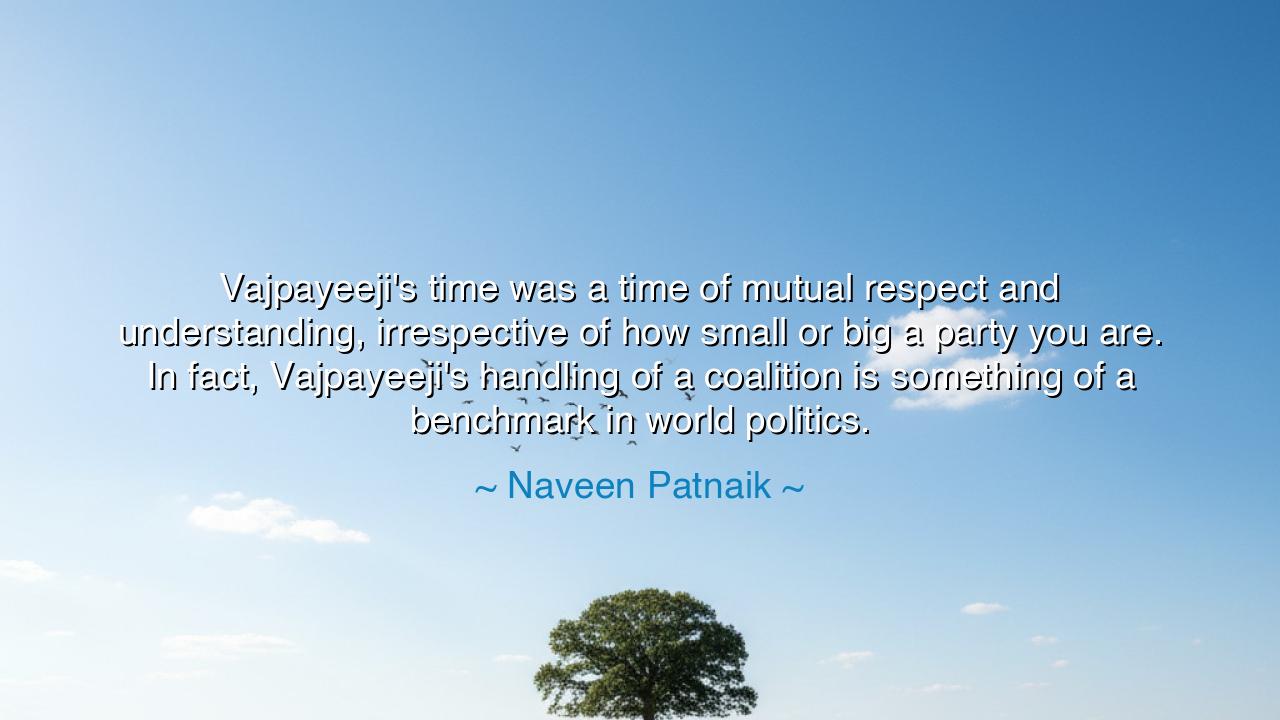
Vajpayeeji's time was a time of mutual respect and understanding
Vajpayeeji's time was a time of mutual respect and understanding, irrespective of how small or big a party you are. In fact, Vajpayeeji's handling of a coalition is something of a benchmark in world politics.






In the annals of leadership, few traits stand as tall as the ability to unite diverse groups under the banner of mutual respect and understanding. Naveen Patnaik, in his reflection on Atal Bihari Vajpayee, touches upon a rare quality of leadership: "Vajpayeeji's time was a time of mutual respect and understanding, irrespective of how small or big a party you are. In fact, Vajpayeeji's handling of a coalition is something of a benchmark in world politics." These words resonate with the timeless truths of what it means to lead with wisdom and fairness, acknowledging that true leadership is not about the power one holds, but the unity one creates, even in the midst of diversity and differences.
In the ancient world, the wisdom of leaders like Alexander the Great and Cyrus the Great was not only in their ability to conquer, but in their remarkable gift for governing diverse peoples. Alexander, after his conquest of Persia, was noted for his efforts to integrate various cultures, respecting the traditions and practices of the lands he ruled. Cyrus the Great, too, is remembered for his treatment of his subjects with respect and dignity, regardless of their background or nationality. These leaders understood that lasting power was not founded on domination, but on fostering understanding and respect among varied groups. Vajpayeeji’s leadership style, as described by Patnaik, mirrors this ancient wisdom, for he led not with an iron fist, but with a spirit of inclusive governance that embraced all.
The coalition politics that Vajpayee navigated during his tenure as India’s Prime Minister were fraught with challenges. Yet, where many leaders might have seen a fractured political landscape, Vajpayee saw an opportunity to build bridges. His approach was grounded in mutual respect, acknowledging the importance of each voice, no matter how small or large the party might be. In doing so, he cultivated a rare unity among parties with varying ideologies, laying the foundation for cooperation in a system that often seems defined by conflict. His leadership echoed the ancient understanding that a ruler’s true strength lies not in overpowering opposition but in bringing diverse forces together for the greater good.
Consider, too, the story of King Solomon, whose wisdom is legendary. It is said that when two women came before him, each claiming to be the mother of the same child, Solomon did not rush to a conclusion based on power or emotion. Instead, he proposed a solution that tested the true nature of the conflict, offering the baby to be split in half. In the end, the true mother revealed herself, not through force, but through wisdom and understanding. Like Solomon, Vajpayeeji sought not to dominate but to find the middle path, where respect for all parties allowed for cooperation and peace.
Patnaik’s reflection reveals the value of this approach to leadership: that true leaders are those who rise above division and foster a culture of respect and dialogue. Vajpayeeji’s ability to manage a coalition was not about compromising his own beliefs or yielding to every pressure, but about creating an environment where all voices could be heard, all opinions considered, and decisions made with the collective well-being in mind. His leadership was not defined by confrontation, but by his ability to build consensus even among deeply divided factions. In this, he set a benchmark for all future leaders to follow—a lesson in how to govern with wisdom and courage.
The lesson for us, then, is clear: leadership is not about seeking to dominate, but about creating an environment where all individuals are treated with respect and understanding. In our own lives, whether we hold positions of power or serve as humble members of society, we can all learn from Vajpayeeji’s example. When we approach each person, no matter their background or beliefs, with a spirit of respect, we open the door to dialogue and cooperation. This principle is not confined to politics; it applies to every sphere of life, from our families to our workplaces, and to the broader global community.
Let us, therefore, strive to emulate the leadership of Vajpayeeji, seeking to build rather than divide, to respect rather than disregard, and to unify rather than separate. The true strength of a leader lies not in their ability to command, but in their ability to bring others together, to forge alliances from differences, and to uphold the dignity and worth of every individual, regardless of their size or stature. Through this, we will not only create stronger communities, but we will leave a lasting legacy of wisdom and peace for generations to come.






AAdministratorAdministrator
Welcome, honored guests. Please leave a comment, we will respond soon